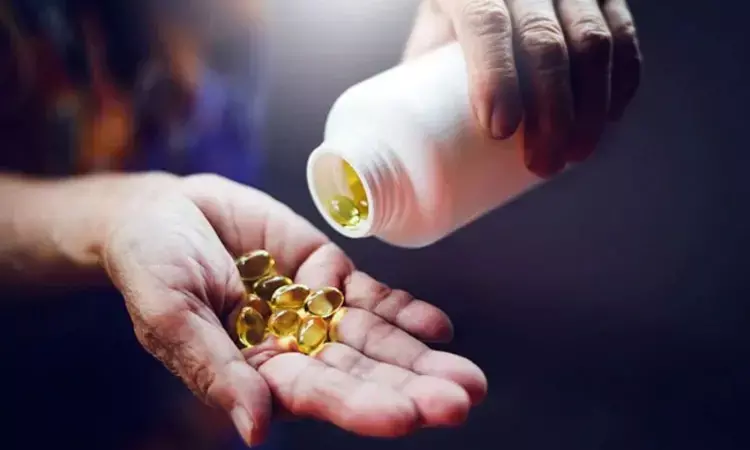- Home
- Medical news & Guidelines
- Anesthesiology
- Cardiology and CTVS
- Critical Care
- Dentistry
- Dermatology
- Diabetes and Endocrinology
- ENT
- Gastroenterology
- Medicine
- Nephrology
- Neurology
- Obstretics-Gynaecology
- Oncology
- Ophthalmology
- Orthopaedics
- Pediatrics-Neonatology
- Psychiatry
- Pulmonology
- Radiology
- Surgery
- Urology
- Laboratory Medicine
- Diet
- Nursing
- Paramedical
- Physiotherapy
- Health news
- Fact Check
- Bone Health Fact Check
- Brain Health Fact Check
- Cancer Related Fact Check
- Child Care Fact Check
- Dental and oral health fact check
- Diabetes and metabolic health fact check
- Diet and Nutrition Fact Check
- Eye and ENT Care Fact Check
- Fitness fact check
- Gut health fact check
- Heart health fact check
- Kidney health fact check
- Medical education fact check
- Men's health fact check
- Respiratory fact check
- Skin and hair care fact check
- Vaccine and Immunization fact check
- Women's health fact check
- AYUSH
- State News
- Andaman and Nicobar Islands
- Andhra Pradesh
- Arunachal Pradesh
- Assam
- Bihar
- Chandigarh
- Chattisgarh
- Dadra and Nagar Haveli
- Daman and Diu
- Delhi
- Goa
- Gujarat
- Haryana
- Himachal Pradesh
- Jammu & Kashmir
- Jharkhand
- Karnataka
- Kerala
- Ladakh
- Lakshadweep
- Madhya Pradesh
- Maharashtra
- Manipur
- Meghalaya
- Mizoram
- Nagaland
- Odisha
- Puducherry
- Punjab
- Rajasthan
- Sikkim
- Tamil Nadu
- Telangana
- Tripura
- Uttar Pradesh
- Uttrakhand
- West Bengal
- Medical Education
- Industry
Vitamin D toxicity leads to acute renal failure in 23-year-old male: Case report

USA: Vitamin toxicity is an increasingly frequent clinical diagnosis that can be difficult to recognize initially, given the easy availability of many over-the-counter supplements.
A recent case study published in Military Medicine describes the case of acute renal failure secondary to unrecognized high-dose over-the-counter vitamin supplementation and subsequent vitamin D hypervitaminosis initiated by a military inductee in the hope of boosting testosterone production.
The article stated, "This clinical scenario shows the dangers of easily accessible, often seemingly benign supplements and the requirement for greater awareness and education of supplementation use."
The case by Nicholas Mason, USAF, Midwestern University, Ocotillo Hall, Glendale, AZ, USA, and the team, concerns a 23-year-old male active duty service member who presented to a civilian standalone urgent care clinic for two weeks of vomiting, nausea, and jaw pain and was subsequently transferred to an inpatient military medical facility after the elevation of his creatinine to 3.5 mg/dL with systolic blood pressures in the 180s.
Initially, the aetiology of the acute kidney injury was unclear as there appeared to be no apparent historical evidence of hypotension, toxic ingestion, external insult, urinary abnormalities, obstruction, or pre-existing condition.
The patient was most concerned about his severe jaw pain, for which he had taken eight tabs of 81 mg aspirin and Ibuprofen 400 mg daily for about one week before the presentation. He denied taking any pre-workout or other workout enhancers and indicated his only regular medications were a daily multivitamin, B12, and vitamin D supplements.
The initial workup for gastroenteritis was negative. The patient was suggested to be euvolemic and maintain large-volume fluid intake with appropriate, brisk urine output. Urine microscopy, urinalysis, renal ultrasound, autoimmune panels, infectious titers, and protein electrophoresis were ordered and unexceptional. The highly diluted urine showed no crystals, casts, or dysmorphic cells. Renal artery ultrasound and aldosterone/renin panels also did not indicate a cause of his severe hypertension or renal injury.
The patient's main complaint transitioned to his jaw, requiring opioids for control. Investigation revealed normal PTH levels but very high levels of serum vitamin D 25-hydroxy. Upon further interview of the patient, he revealed to be taking at least 10,000 IU of vitamin D daily for the past six months to raise his natural testosterone levels.
His creatinine had improved to 2.09 mg/d, one-month post-hospitalization, and he continued to have mild hypercalcemia to 10.4 mg/dL. At three months, his renal function returned to normal, and so did his calcium levels. Six months after hospitalization, his vitamin D 25-hydroxy levels had decreased to a reasonable 80 ng/mL.
Despite a negative secondary hypertensive workup, he remained hypertensive. His acute kidney injury was deemed by nephrology to be secondary to hypervitaminosis D with possible acute tubular necrosis overlap from aspirin/NSAID toxicity in the setting of impaired renal function, and his jaw pain secondary to his vitamin D-driven hypercalcemia and increased bone resorption.
"This case demonstrates the harm that can come from unsubstantiated health claims and abuse of seemingly innocuous substances," Mason and the team stated. "Educating patients on the spurious association between vitamin D and testosterone levels is challenging partly because of popular media distortion."
"There is limited specific knowledge concerning the use of vitamin D supplementation within the military population, and greater study and active monitoring may prove necessary given current supplementation trends," they concluded.
Reference:
Mason, N., Sweet, L. M., Wills, Z., & Schall, S. Vitamin D Abuse in Pursuit of "Gains" Resulting in Acute Kidney Injury. Military Medicine. https://doi.org/10.1093/milmed/usad237
Dr Kamal Kant Kohli-MBBS, DTCD- a chest specialist with more than 30 years of practice and a flair for writing clinical articles, Dr Kamal Kant Kohli joined Medical Dialogues as a Chief Editor of Medical News. Besides writing articles, as an editor, he proofreads and verifies all the medical content published on Medical Dialogues including those coming from journals, studies,medical conferences,guidelines etc. Email: drkohli@medicaldialogues.in. Contact no. 011-43720751


